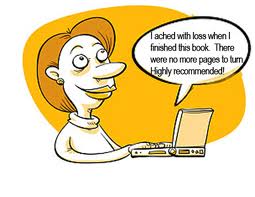Five Indie Author Tips For A Successful Live Ebook Launch
We going to be launching ALLi's Choosing A Self-Publishing Service 2013 at London Book Fair as an ebook. So we're…
We going to be launching ALLi's Choosing A Self-Publishing Service 2013 at London Book Fair as an ebook. So we're…
It's never nice to be criticised but the great thing about keeping on writing and publishing is that, over time,…
If you're an indie author, you can't get international book deals, right? Wrong. Today, over at IndieRecon, I'm sharing five…
Thanks to the joys of self-publishing, and of working for The Alliance of Independent Authors (ALLi), 2012 has been an amazing year…
Is the new business model for publishers to be selling over-priced and under-performing services to writers? That's the question that…
Calling ALLi Members: As some of you know, we are doing a monthly giveaway through our Goodreads Group, starting this…
Marketeers say the key to promoting a book is to take off your writer's hat. But, argues Orna Ross, that…
As more and more self-publishing authors make a success of our endeavours, more agents and publishers come calling. But too often they come with a traditional publishing contract in hand. This fails to recognise that an indie author's situation is different to that of a tyro, unpublished author.
As self-publishers, we have built our readership and already have a following. Our e-rights are very valuable to us and we're not keen to bundle them with other rights. We expect publishers to understand that our situation is different — and to reflect this in their contractual terms and conditions.
Here are four questions that an indie should ask before signing any deal with an agent. (Please note, the first three questions pertain to signing with agents for English language rights; only the fourth to translation rights, which is a different proposition, requiring a different set of questions).
We'll have a blog post on that, and on questions to ask if you're considering signing directly with a publisher, soon.
1. Will my self-publishing income be
Today, in the fifth and final part of our ‘Which Distributor’ series, Orna Ross explains how independent authors can successfully work with trade publishers to distribute some of their books.
At a writers conference, an agent and writer are putting out tentative feelers towards each other. The agent is from a venerable company, with a long list of illustrious clients. The writer is an independent author, who has earned her indie spurs by successfully self-publishing two ebook thriller titles (with more on the way) and building a vibrant and growing fanbase, both for her books and her writing advice website.
The agent wants to sign this author, who is young, hardworking, full of ideas, with many books ahead of her. The author is actively seeking a trade publisher, because she wants a third party to handle print. For her, print takes too long and requires the sort of activities that don't interest her. It's the one thing trade publishing can do better than she can do for herself, she believes.
The two talk, they seem to understand each other. Back home, the agent sends over an Author Representation Agreement but before she's read too far, the writer is concerned. A clause states that the agent will
 GUEST POST: By Ben Cameron of Smith Publicity.
GUEST POST: By Ben Cameron of Smith Publicity.
For publicity purposes, there are essentially two kinds of blogs, those that are an offshoot of another form of media, such as a newspaper, magazine or radio show; and those that are independent stand-alones. Either way, they are usually written by a single individual or a small group and have a very personal feel to them.
Like people, blogs can be quirky, opinionated and prejudiced. You are off to a great start if you think if them as people – as funny as your Aunt Bessie or grumpy as your old Uncle Carl.
1) Blogs Are Not an Afterthought
When it comes to media, some rank contacts in order of ‘importance’, with television being the golden ticket and blogs being something you try once other
 Our decision here at The Alliance of Independent Authors (ALLi) to hire a rights agent to represent our members' books in translation markets has raised the hackles of those who think an indie author is not allowed to make publishing partnerships.
Our decision here at The Alliance of Independent Authors (ALLi) to hire a rights agent to represent our members' books in translation markets has raised the hackles of those who think an indie author is not allowed to make publishing partnerships.
Snarky comments emerging across the Internet, of the indies-admit-they-are-not-so-indie-after-all variety, show that there is still fundamental misunderstanding of what it means to be an indie author or self-publisher.
Here at ALLi, our definition of an indie is one who recognises the writer as the primary driver of the book, not just in getting it written but also in